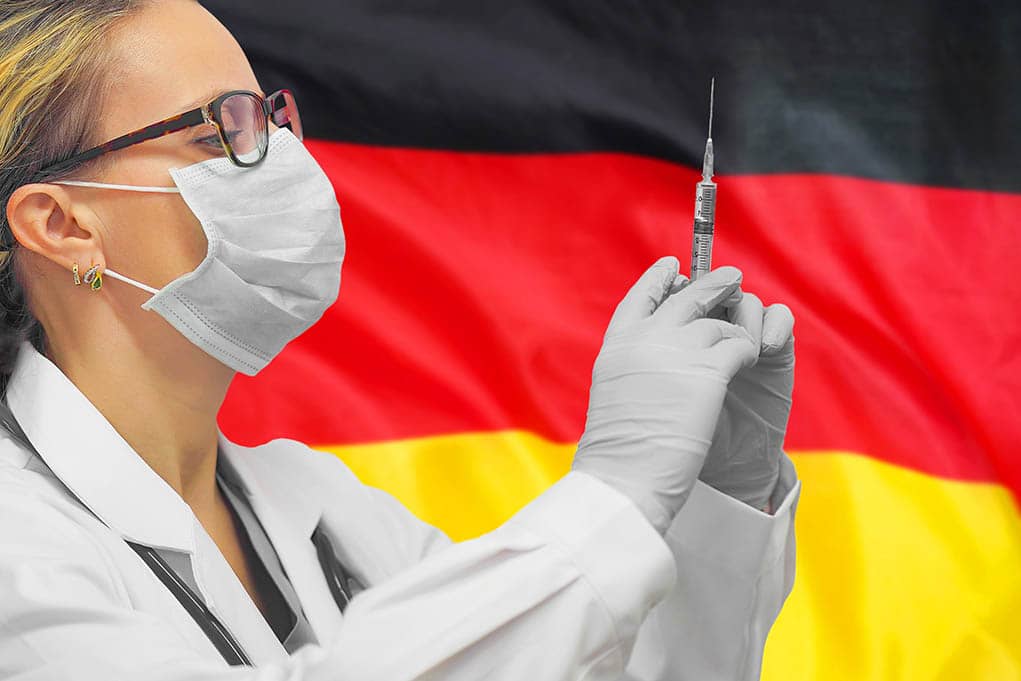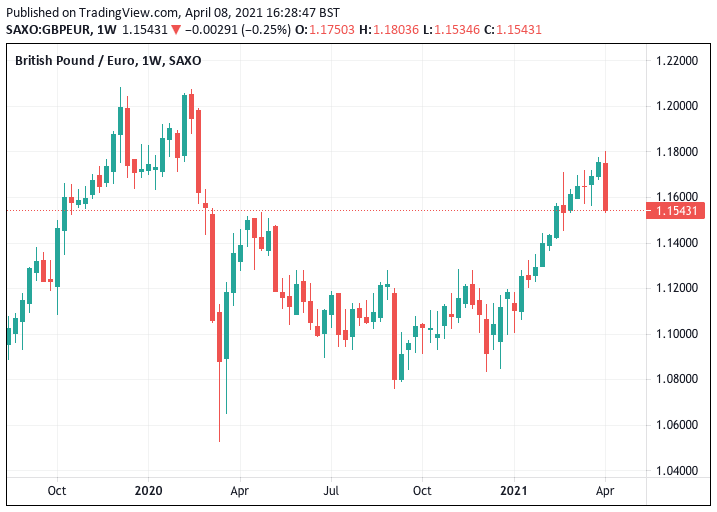Pound Sterling Heads for Biggest Weekly Drop against the Euro Since Sept. 2020
- Written by: Gary Howes
-
- EU vaccinations pickup sharply
- Drives demand for the Euro
- GBP endures sharp losses as first week of April ends

Germany recorded a new record for daily vaccinations. Image © Adobe Stock.
- Market rates at publication: GBP/EUR: 1.1536 | GBP/USD: 1.3727
- Bank transfer rates: 1.1313 | 1.3443
- Specialist transfer rates: 1.1455 | 1.3630
- Get a bank-beating exchange rate quote, here
- Set an exchange rate alert, here
The British Pound is on course to record its sharpest weekly decline against the Euro since September 2020, a time when the EU and UK faced a logjam in Brexit trade negotiations that lead markets to raise bets a 'no deal' outcome was increasingly likely.
The fall in Sterling in April 2021 however has no clear narrative behind it, although some analysts are pointing a tentative finger at the hiccup in the UK's vaccination rollout stemming from the UK medical regulator's decision to restrict the distribution of the country's 'workhorse' AstraZeneca vaccine.
The Pound-to-Euro exchange rate declined by a third of a percent on Thursday to record a five-week low at 1.1540, having been as high as 1.1800 at the start of the week.
The weekly decline is now 1.80% at the time of writing.
Marshall Gittler at BDSwiss says blaming the regulator's change of guidance on the AstraZeneca vaccine is unconvincing given that the most of the Eurozone's largest countries have applied similar, if not more restrictive, conditions on the same vaccine.
Above: The weekly decline in GBP/EUR is the steepest since Sept. 2020.
If anything, news out of the UK on the vaccination front remains positive with official data showing the number of vaccinations delivered on Wednesday exceeded 500K once more, suggesting an Easter drop off is now in the rear-view mirror.
The prospects of the UK exiting restrictive lockdown conditions meanwhile looks all the more certain based on modelling from University College London (UCL), that shows Britain will pass the threshold for herd immunity on Monday 11 April.
If the modelling is correct a resurgence of covid-19 infections and hospitalisations is incredibly remote and businesses and consumers alike can continue investing in a post-covid future, thereby driving a strong economic rebound.
"I think one of the main reasons GBP is falling could be just positioning and trend-following," says Gittler, "I'm skeptical about this setback".
Above: GBP relative performance in the week commencing April 05.
"The GBP correction is symptomatic of a market that had become overly positioned at bad levels after a long trend move, positioning finally peaked as many cited the past strong April seasonals... GBP will ultimately regain its poise and drift higher," says Jonathan Pierce, a trader at Credit Suisse.
While the Pound went lower by a third of a percent against the Euro on Thursday it is notable that the currency was steady against the Dollar, this was reflected in an Euro-to-Dollar exchange rate that was a third of a percent higher at 1.19.
This suggests the most recent decline in GBP/EUR is more a function of Euro strength than a reboot of the mid-week Sterling weakness.
The rally in the Euro exchange rate complex comes as the EU sees a sharp increase in vaccination rates suggesting the area's woes concerning vaccinations is coming to an end.
Numerous EU countries, including Germany, recorded a fresh daily record on Wednesday, signalling to markets that a strong vaccine-induced rebound lies ahead.
Sterling was a beneficiary through January, February and March of the UK's rapid vaccine rollout, which contrasted most strikingly with a tepid rollout in the EU.
Signs that this differential with Europe is now closing is therefore offering the Euro fresh support at Sterling's expense.
{wbamp-hide start}{wbamp-hide end}{wbamp-show start}{wbamp-show end}
We reported on Thursday that research from Citi and Goldman Sachs shows that the Euro stands to benefit as the EU vaccination accelerates in April, allowing foreign exchange markets to focus on a strong Eurozone recovery in the second half of the year.
"We think markets priced much negative Covid news, says Ebrahim Rahbari, Chief G10 Currency Strategist at Citi.
Analysts at NatWest Markets tell clients the second quarter should see significantly higher vaccine supplies from existing producers which include AstraZeneca, Moderna and Pfizer who should together deliver almost three times the amount of doses in the second quarter compared to the first quarter.
This is even after accounting for lower than planned AstraZeneca supply in the second quarter.
"Added to this, Johnson & Johnson vaccinations should begin, with supply reportedly being delivered to European countries from mid-April – this adds an additional 55 million doses to the Q2 total," says Imogen Bachra, European Rates Strategist at NatWest Markets.
The European Commission now looks on target to vaccinate a minimum 70% of the entire adult population by the end of the summer.
"If we look at the Euro area more broadly, the health situation looks better than the public debate might suggest. Despite the further twists and turns in the AstraZeneca saga, the overall pace of vaccinations is finally starting to surge," says economist Jan Hatzius at Goldman Sachs.
EU countries are nevertheless grappling with a third wave of covid-19 infections that has prompted the extension of lockdowns in Italy, a fresh lockdown in France and calls by Germany's Chancellor Angela Merkel for Germany to do the same.
But Goldman Sachs tell clients the virus numbers themselves are not as bad as widely believed, with both positivity rates and fatalities fairly stable despite selective reopening and generally stronger-than-expected economic data.
"Our FX strategists think the end of the recent Euro selloff is near and see a significant appreciation over the next year," he adds.
Goldman Sachs say it is easy to imagine Europe outperforming their baseline forecasts if Germany and other manufacturing-dependent economies continue to benefit from a strong global industrial rebound, while an earlier-than-expected vaccination breakthrough rescues the Southern European tourist season.

